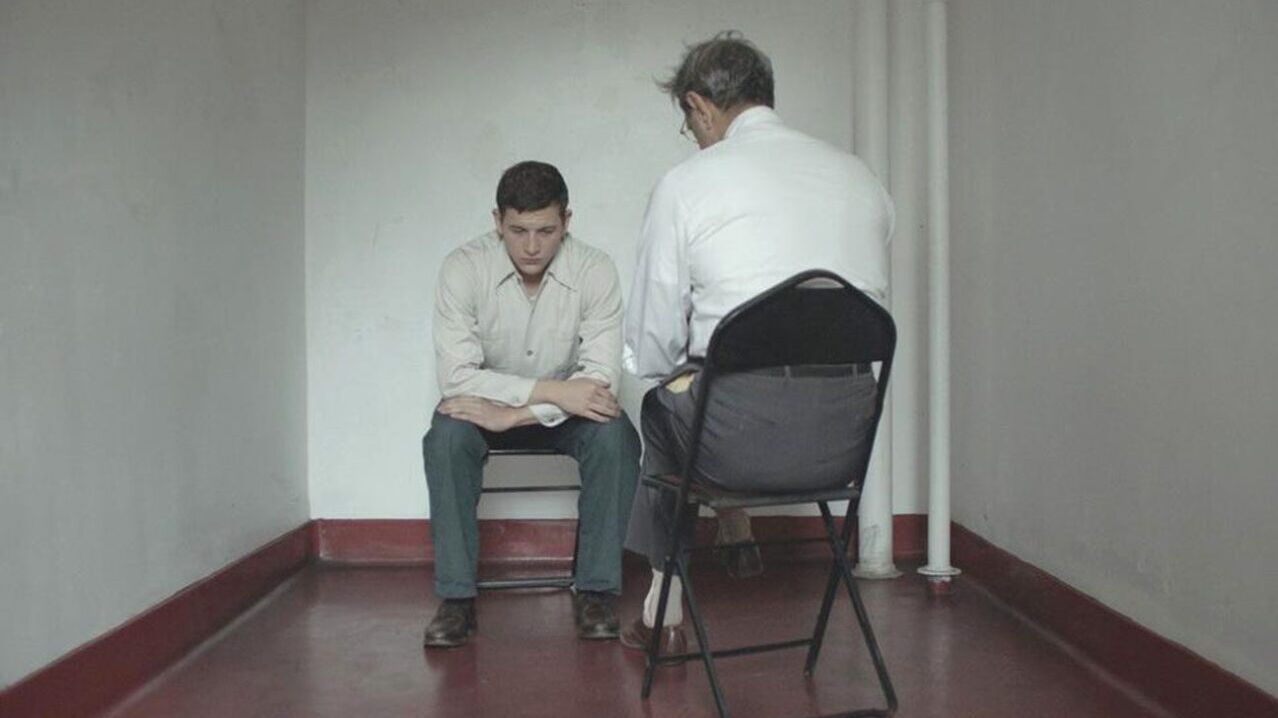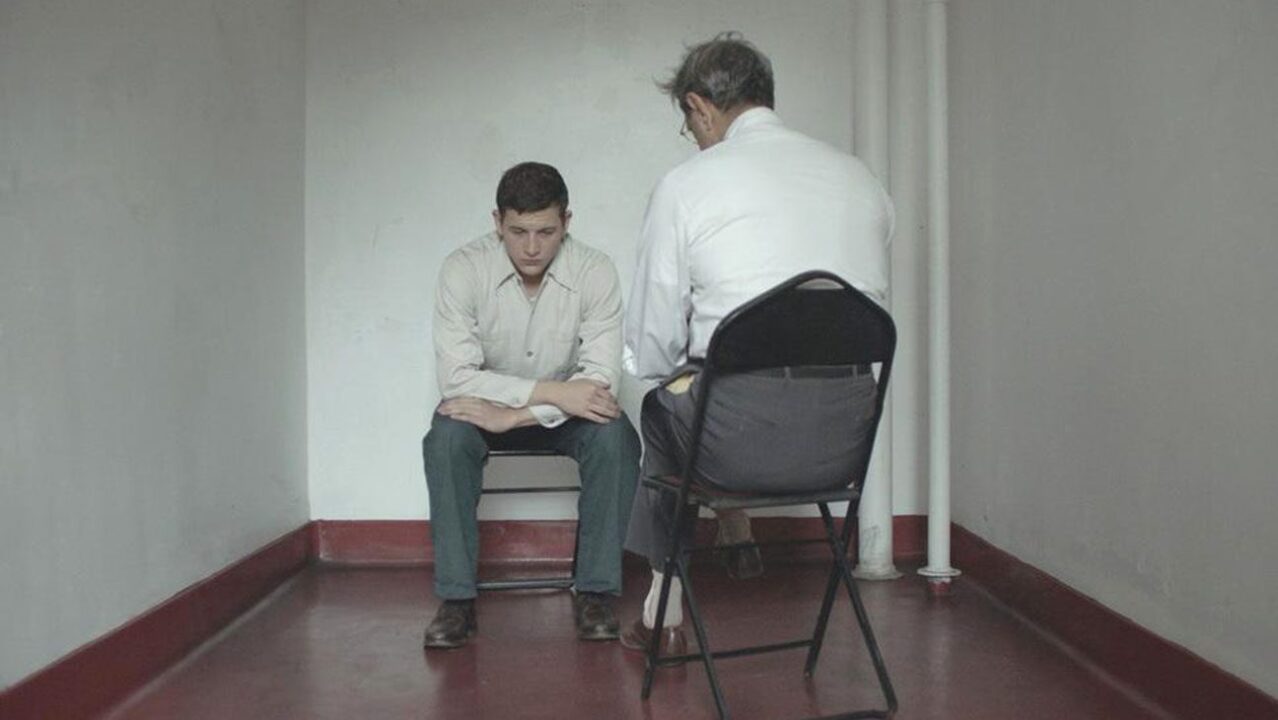THE MOUNTAIN (2019)
Starring Tye Sheridan, Jeff Goldblum, Hannah Gross
Directed by Rick Alverson
Written by Rick Alverson, Dustin Guy Defa, Colm O’Leary
Distributed by Kino Lorber. 106 minutes. Opens this Friday at the Nuart Theatre.
With its grandly epic title alone, it’s as if director Rick Alverson is announcing to audiences that The Mountain will be as equally challenging a feat, requiring active participation in order to keep up. And with its slowly unfolding and glacially moving pace, along with its serious, deliberate tone (mostly composed of silent internalizing), it certainly lives up to what could be that intention. While this summation could sound like a detractor, I don’t think it’s unfair, nor do I think it should even come across as a critique. Those who saw Alverson’s previous film, 2015’s Entertainment, should already be aware of the sort of perverse performative pleasure one might get in withholding and restricting the familiarity and easy accessibility that audiences are so expectant of with traditional narrative storytelling. The Mountain branches out from Entertainment‘s same sort of post-modern sensibility, but into a more dramatic and even more self-assured world, making for a larger and appreciated creative leap which mostly all holds together.
Credit the cast of The Mountain – working from a script co-written by Alverson, Dustin Guy, and Colm O’Leary – who commit to Alverson’s avant-garde approach with this project. In this ambiguously ’50s-set mid-west expanse, Andy (Tye Sheridan) works for his father, Frederick (Udo Kier), at the local skating rink. Andy longs to visit his mother, but it’s his father who denies his son’s desire as she is under psychiatric care at a state hospital. It’s the offer of employment that Andy receives from Dr. Wallace Fiennes (Jeff Goldblum), Andy’s mother’s former physician, that gets him to join on a tour of hospitals, photographing the lobotomies that Dr. Wallace is to perform. What comprises The Mountain, along with momentary detours into abstract surrealism, is a series of pit stops through sterile hospital hallways and operating rooms, all populated with the vacantly staring faces of mental patients that gets Andy to question his own mental state, which is where the film explores the line between the accepted state of sanity and the insane.
It’s these two states that come to life through the characters of Andy and Wally, both counter-balances who embody the opposing natures of man: Andy being stoic and observant countered with Wally’s expressive and performative nature. Sheridan (who joins Alverson once again after a role in Entertainment) is tasked with holding the abstractly air-tight tone of the film together, and at only 22 years old, shows that he has the commanding presence to do so. Sheridan’s withheld performance counters the eccentric yet poised performance of Jeff Goldblum’s debonaire doctor, which is a continual point of entertainment in the film. There’s a small wealth of other actors that fill out the rest of this world, including Hannah Gross (Mindhunter) as a transfixing young lobotomy patient who catches Andy’s eye. And no review would be complete without the mention of Denis Lavant as Jack, Hannah’s father and expressive philosophizer who, when his character is revealed in the film’s third act, maniacally contorts and drools his way into embodying the film’s very question of lunacy or not.
The Mountain is a challenging film – nearly Lynchian in its ambiguity at times – which will likely deter a large majority of viewers. But it’s undeniable that Rick Alverson is realizing a vision of complex questions and ideas. If nothing else, audiences should be able to acknowledge the production elements that make this film so visually and sonically distinct: the cinematography (by Lorenzo Hagerman) feels like an old faded Polaroid photo come to life at any moment, and the score (by Robert Donne) is a sneakily arresting arrangement of musical cues and sounds that conjure the film’s ranging emotional unrest. To the photography’s end, notice how formally composed nearly every element in the film is, begging to be pointed out by the viewer as being a total construction and fabrication. Perhaps the film’s entire philosophy is summed up when Andy asks Jack about a painting of a mountain hung up on Jack’s home wall: Jack snarls and seethes back that it is not a mountain – that it is just a picture. Whether or not the film is aware that it directly acknowledges René Magritte’s famous painting “The Treachery of Images” (in which the picture of a pipe is accompanied with the words: This is Not a Pipe), the film shows its hand at being just as disingenuous a production, imploding the entire question of the surrealist dilemma on display. It’s sane people play-pretending as the doctor and the psychotic. Yes, that’s Jeff Goldblum. It’s all both real and fake, sane and insane and all at the same time. It’s both a mountain and it’s just a picture, whichever way you view it.
‘The Mountain’ made its world premiere at the Venice Film Festival, showed at this year’s Sundance Film Festival, and was included in the Red Bull Music Festival Los Angeles as part of the Center Channel film program, originally posted on February 11, 2019.
Ryan Rojas
Ryan is the editorial manager of Cinemacy, which he co-runs with his older sister, Morgan. Ryan is a member of the Hollywood Critics Association. Ryan's favorite films include 2001: A Space Odyssey, The Social Network, and The Master.


